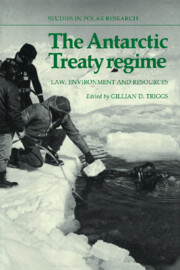Book contents
- Frontmatter
- Contents
- List of contributors
- List of Antarctic Treaty Parties
- Foreword
- Introduction
- Frontispiece: Map of national claims
- Part I Antarctica: physical environment and scientific research
- Part II The Antarctic Treaty regime: legal issues
- Part III The Antarctic Treaty regime: protecting the marine environment
- Part IV The Antarctic Treaty regime: minerals regulation
- Part V Whither Antarctica? Future policies
- Part VI Conclusion
- Selected reading
- Appendix 1
- Appendix 2
Introduction
Published online by Cambridge University Press: 20 January 2010
- Frontmatter
- Contents
- List of contributors
- List of Antarctic Treaty Parties
- Foreword
- Introduction
- Frontispiece: Map of national claims
- Part I Antarctica: physical environment and scientific research
- Part II The Antarctic Treaty regime: legal issues
- Part III The Antarctic Treaty regime: protecting the marine environment
- Part IV The Antarctic Treaty regime: minerals regulation
- Part V Whither Antarctica? Future policies
- Part VI Conclusion
- Selected reading
- Appendix 1
- Appendix 2
Summary
Antarctica, known to most people as an ice blue and beautiful but isolated and fragile continent, has long been of interest to scientists, explorers and a handful of diplomats. Its history is redolent with dramatic images of courage and comradeship, tragedy and triumph. The exploitation of marine living resources, and more recently mineral and oil resources have, however, been the dominant forces behind international interest in Antarctica. Enticed by Cook's voyages, seal hunters explored the South Antarctic islands in the late eighteenth century. Over-exploitation of seal herds lead others in the 1830s to move closer to the Antarctic continent for elephant seals and whales. Today, the depletion of fish stocks and the expansion of coastal state sovereignty over 200 mile Exclusive Economic Zones has again focussed attention upon the southern oceans, this time to harvest krill. Extravagant hopes for mineral and oil wealth, inflamed by negotiations for an Antarctic minerals regime, have directed international attention to Antarctic non-living resources, thereby prompting fears for the conservation of this fragile and beautiful continent.
It was at a time when commercial interests in Antarctica had declined, and when individual scientific research was highly esteemed, that 12 states were able to negotiate the Antarctic Treaty in 1959. Compelled by the need to avert tension and disorder and by a determination that scientific research should continue unimpeded, these states successfully avoided the formidable legal issue of sovereignty and created the Antarctic Treaty regime of interlinked conventions and recommendations. This regime is justifiably hailed as a remarkably effective international system which has largely achieved its relatively modest objectives. Times, however, have changed.
- Type
- Chapter
- Information
- The Antarctic Treaty RegimeLaw, Environment and Resources, pp. xiv - xxiPublisher: Cambridge University PressPrint publication year: 1987
- 1
- Cited by

